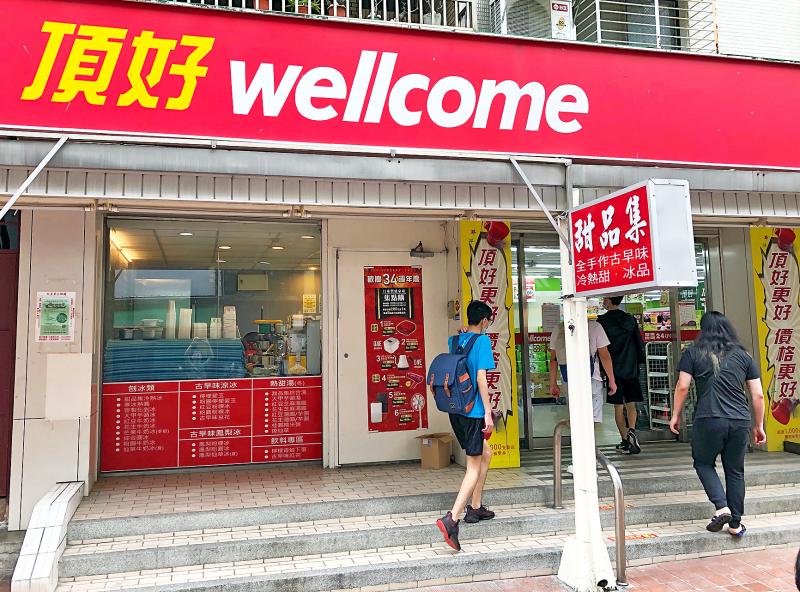Carrefour SA yesterday announced it would acquire Wellcome Taiwan Co (惠康百貨) for 97 million euros (US$108.33 million), and bring all the Wellcome supermarkets (頂好超市) and Jasons Market Place stores nationwide under its banner within 12 months of the deal closing.
The France-based hypermarket chain reached an agreement with Hong Kong-based Dairy Farm International Holdings (牛奶國際控股), the pan-Asian retailer that launched Wellcome Taiwan in 1987.
The transaction involves 199 Wellcome supermarkets, which have average sales areas of 420m2 and 25 high-end Jasons Market Place stores, which have an average sales area of 820m2, as well as a warehouse in Taoyuan, Carrefour Taiwan (家樂福) said in a statement.

Photo: CNA
Carrefour Taiwan would continue to run the 224 stores it is gaining under the deal, but would consider whether to adjust their locations as their leases mature, a Carrefour Taiwan official told the Taipei Times by telephone.
However, it plans to place the Wellcome outlets under its Carrefour Market (家樂福便利購) banner within one year of the deal being finalized, and convert the Jasons Market Place outlets to a Carrefour premium banner, given most of those stores are located in shopping malls and department stores, said the official, who declined to be named.
“We would have different strategies to operate the two supermarket chains, as they target different groups of customers and offer different products,” the official said.
Carrefour Taiwan has not decided how it would handle the employees of the two supermarket chains, the official added.
Carrefour Taiwan currently operates 137 stores nationwide: 68 hypermarkets and 69 supermarkets.
It expects to accelerate its development in the supermarket industry, Carrefour Taiwan said.
Once the deal goes through, Carrefour Taiwan would have 361 outlets, which would make it the second-largest supermarket chain operator in Taiwan in terms of sales, behind Pxmart Co Ltd (全聯實業), the official said.
“By combining these businesses, customers and team members will benefit from the group’s greater strength and scale. The quality, prices and service offered to Taiwanese consumers would thus be improved,” Carrefour Taiwan said in a statement.
Wellcome Taiwan posted net sales of about 390 million euros last year.
Carrefour Taiwan posted net sales of 1,968 million euros, earnings before interest, taxes, depreciation and amortization of 209 million euros and recurring operating income of 83 million euros, it said.
The transaction is expected to close by the end of this year, and Carrefour Taiwan plans to apply to the Fair Trade Commission (FTC) for approval soon, it said.
“Whether the FTC approves Carrefour Taiwan’s application is crucial, as the firm is already a leading hypermarket chain operator and now it wants more share of the supermarket pie,” a market analyst said by telephone.

South Korea’s equity benchmark yesterday crossed a new milestone just a month after surpassing the once-unthinkable 5,000 mark as surging global memory demand powers the country’s biggest chipmakers. The KOSPI advanced as much as 2.6 percent to a record 6,123, with Samsung Electronics Co and SK Hynix Inc each gaining more than 2 percent. With the benchmark now up 45 percent this year, South Korea’s stock market capitalization has also moved past France’s, following last month’s overtaking of Germany’s. Long overlooked by foreign funds, despite being undervalued, South Korean stocks have now emerged as clear winners in the global market. The so-called “artificial intelligence

‘SEISMIC SHIFT’: The researcher forecast there would be about 1.1 billion mobile shipments this year, down from 1.26 billion the prior year and erasing years of gains The global smartphone market is expected to contract 12.9 percent this year due to the unprecedented memorychip shortage, marking “a crisis like no other,” researcher International Data Corp (IDC) said. The new forecast, a dramatic revision down from earlier estimates, gives the latest accounting of the ongoing memory crunch that is affecting every corner of the electronics industry. The demand for advanced memory to power artificial intelligence (AI) tasks has drained global supply until well into next year and jeopardizes the business model of many smartphone makers. IDC forecast about 1.1 billion mobile shipments this year, down from 1.26 billion the prior

People stand in a Pokemon store in Tokyo on Thursday. One of the world highest-grossing franchises is celebrated its 30th anniversary yesterday.

Chinese artificial intelligence (AI) start-up DeepSeek’s (深度求索) latest AI model, set to be released as soon as next week, was trained on Nvidia Corp’s most advanced AI chip, the Blackwell, a senior official of US President Donald Trump’s administration said on Monday, in what could represent a violation of US export controls. The US believes DeepSeek will remove the technical indicators that might reveal its use of American AI chips, the official said, adding that the Blackwells are likely clustered at its data center in Inner Mongolia, an autonomous region of China. The person declined to say how the US government received